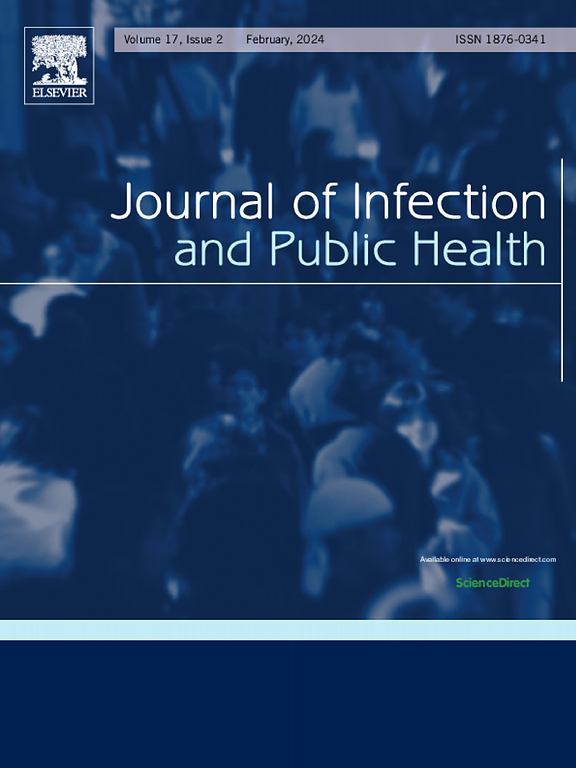2021年夏季加泰罗尼亚三角洲变种的传播:建模和解释
IF 4.7
3区 医学
Q1 INFECTIOUS DISEASES
引用次数: 0
摘要
高传染性SARS-CoV-2变体的出现给全球公共卫生工作带来了重大挑战。2021年夏季,在西班牙加泰罗尼亚,Delta型变型(B.1.617.2)迅速取代了Alpha型变型(B.1.1.7),尽管正在开展疫苗接种运动,但仍导致感染再次出现。了解此次疫情的流行病学驱动因素对于完善未来的缓解战略至关重要。方法采用贝叶斯年龄分层流行病学模型,结合疫苗接种状况和变异特异性传播动态,分析加泰罗尼亚的疫情。该模型使用每日报告病例、住院情况、测序数据和各年龄组的疫苗接种覆盖率进行校准。我们动态地推断接触模式,以评估它们在流行病复发中的作用,并估计Delta变体比Alpha变体的传播优势。结果:我们的分析显示,年轻、接种疫苗较少的人群之间的社会互动增加,是导致感染激增的重要原因。圣胡安的长周末(6月23日至24日)恰逢接触率的高峰,导致繁殖数量上升,特别是在20-29岁的个体中。我们估计德尔塔型有40-60。结论我们的研究结果强调了疫苗接种覆盖率在减轻新变体影响方面的关键作用。社会互动的增加和疫苗分配的不平衡加剧了由德尔塔病毒推动的疫情复苏。事实证明,仅靠国家行动计划在控制传播方面是不够的,这突出了有针对性的疫苗接种战略对实现强有力的流行病控制的必要性。这项研究为评估未来特定变异的威胁和提供量身定制的公共卫生干预措施提供了一个框架。本文章由计算机程序翻译,如有差异,请以英文原文为准。
The spread of the Delta variant in Catalonia during summer 2021: Modelling and interpretation
Background
The emergence of highly transmissible SARS-CoV-2 variants has posed significant challenges to public health efforts worldwide. During the summer of 2021, the Delta variant (B.1.617.2) rapidly displaced the Alpha variant (B.1.1.7) in Catalonia, Spain, leading to a resurgence in infections despite ongoing vaccination campaigns. Understanding the epidemiological drivers of this outbreak is critical for refining future mitigation strategies.
Methods
We employed a Bayesian age-stratified epidemiological model, incorporating vaccination status and variant-specific transmission dynamics, to analyze the outbreak in Catalonia. The model was calibrated using daily reported cases, hospitalizations, sequencing data, and vaccination coverage across age groups. We inferred contact patterns dynamically to assess their role in the epidemic resurgence and estimated the transmission advantage of the Delta variant over Alpha.
Results
Our analysis revealed that increased social interactions among younger, less vaccinated populations significantly contributed to the surge in infections. The long weekend of Sant Joan (June 23–24) coincided with a peak in contact rates, driving a rise in the reproduction number, particularly among individuals aged 20–29. We estimated that the Delta variant had a 40–60.
Conclusions
Our findings underscore the critical role of vaccination coverage in mitigating the impact of emerging variants. The combination of increased social interactions and uneven vaccine distribution exacerbated the Delta-driven resurgence. NPIs alone proved insufficient in controlling transmission, highlighting the necessity of targeted vaccination strategies to achieve robust epidemic control. This study provides a framework for assessing future variant-specific threats and informing tailored public health interventions.
求助全文
通过发布文献求助,成功后即可免费获取论文全文。
去求助
来源期刊

Journal of Infection and Public Health
PUBLIC, ENVIRONMENTAL & OCCUPATIONAL HEALTH -INFECTIOUS DISEASES
CiteScore
13.10
自引率
1.50%
发文量
203
审稿时长
96 days
期刊介绍:
The Journal of Infection and Public Health, first official journal of the Saudi Arabian Ministry of National Guard Health Affairs, King Saud Bin Abdulaziz University for Health Sciences and the Saudi Association for Public Health, aims to be the foremost scientific, peer-reviewed journal encompassing infection prevention and control, microbiology, infectious diseases, public health and the application of healthcare epidemiology to the evaluation of health outcomes. The point of view of the journal is that infection and public health are closely intertwined and that advances in one area will have positive consequences on the other.
The journal will be useful to all health professionals who are partners in the management of patients with communicable diseases, keeping them up to date. The journal is proud to have an international and diverse editorial board that will assist and facilitate the publication of articles that reflect a global view on infection control and public health, as well as emphasizing our focus on supporting the needs of public health practitioners.
It is our aim to improve healthcare by reducing risk of infection and related adverse outcomes by critical review, selection, and dissemination of new and relevant information in the field of infection control, public health and infectious diseases in all healthcare settings and the community.
 求助内容:
求助内容: 应助结果提醒方式:
应助结果提醒方式:


